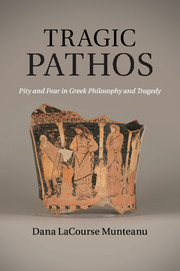Book contents
- Frontmatter
- Contents
- Preface and acknowledgments
- List of abbreviations
- Introduction
- Part i Theoretical views about pity and fear as aesthetic emotions
- Part ii Pity and fear within tragedies
- Chapter 5 An introduction
- Chapter 6 Aeschylus: Persians
- Chapter 7 Prometheus Bound
- Chapter 8 Sophocles: Ajax
- Chapter 9 Euripides: Orestes
- Appendix Catharsis and the emotions in the definition of tragedy in the Poetics
- Bibliography
- Index
- References
Chapter 8 - Sophocles: Ajax
Published online by Cambridge University Press: 05 December 2011
- Frontmatter
- Contents
- Preface and acknowledgments
- List of abbreviations
- Introduction
- Part i Theoretical views about pity and fear as aesthetic emotions
- Part ii Pity and fear within tragedies
- Chapter 5 An introduction
- Chapter 6 Aeschylus: Persians
- Chapter 7 Prometheus Bound
- Chapter 8 Sophocles: Ajax
- Chapter 9 Euripides: Orestes
- Appendix Catharsis and the emotions in the definition of tragedy in the Poetics
- Bibliography
- Index
- References
Summary
A review of interpretations
To effect emotional arousal, the Persians and the Prometheus Bound use different dramatic techniques, which appear to have presented unique cognitive and ethical challenges to the audience. The Persians contains a dynamic plot, with a major change of fortune, but not much variety of internal voices (exclusively Persian, though with an interesting twist in the speech of Darius) that interpret the misfortune. Despite a static dramatic structure, conversely, the Prometheus Bound offers diverse internal views about tragic suffering. The Ajax combines an eventful plot with several internal perspectives on the fall of the hero. My study appraises reactions to this tragedy by examining ways in which the internal models of response could have shaped the spectators’ emotions as well as their understanding of the dramatic action.
Scholars often note that the fall of Ajax, as represented in Sophocles’ tragedy, must have driven the ancient audience to pity. One particular detail likely caused surprise and, perhaps, intense emotion: Sophocles’ representation of Ajax's suicide violates an established tragic convention, according to which deaths are reported by messenger, and thus the audience hears directly the painful reasoning that precedes the death of the hero. Nevertheless, some argue that the spectators could not have felt pity for Ajax, who acts foolishly and, therefore, deserves his fate. Even though certain scenes in the Ajax, such as those involving Tecmessa, may have been conducive to pity, some scholars insist, Ajax does not deserve the audience's sympathy for two main reasons. One argument is that the hero has committed hybris and, therefore, is justly punished by Athena. There is, however, no clear dramatic development in the play to support this interpretation. Indeed, Athena notes that humans ought to avoid hybris (Aj. 127–33) in connection with the hero's plight, but she does so in rather general terms. The other argument is that Ajax acted unethically in the play, and this was obvious to the members of the original audience.
- Type
- Chapter
- Information
- Tragic PathosPity and Fear in Greek Philosophy and Tragedy, pp. 181 - 207Publisher: Cambridge University PressPrint publication year: 2011

